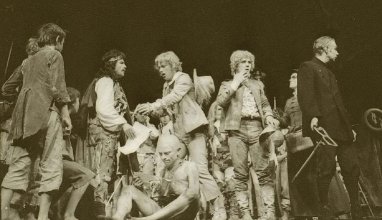Veins of Pure Gold in Bartholomew
Fair
|
The Royal Shakespeare Company's production of
Bartholomew Fair resembles a lump of base metal with veins of pure gold
running through it - most of them stemming from Alan Howard's creation of the
wondering boy, Bartholomew Cokes, all innocence and directness, untainted by
prejudice, bigotry, or the convolutions of his super ego, enjoying every
minute, every person, object, experience for itself.
Everyone else descries for a purpose, for gain,
lust, self-gratification, revenge, reputation.
To show the timeless universality of human
folly - "What petty things they are, wee wonder at? Like children, that esteeme
every trifle ... What difference betweene us and them? But that we are fooles,
cockscombes, at a higher rate?" the programme quotes from an early Fifteenth
Century text - the director, Terry Hands, casts off Jacobean dress and manners,
and plucks reference and flummery from every century since.
|

|
So his Bartholomew looks like an overgrown Regency
child in a suit of apricot silk, his Littlewit a pantomime proctor in
pin-stripe Bermuda shorts; Winwife is elegant in a cream suit and raspberry
ruffled shirt that would produce admiring stares in any discotheque.
The same with props: Ben Jonson might have recognised
the tattered booths and the gingerbread men, but he'd have had some
characteristically ill-natured things to say about the old motor car dolled up
with crimson curtains and serving as a mobile brothel, or the supermarket
trolleys and the beat group that turned up at the fair.
It's a splendid idea, and everyone works away at it
like mad, but it only illuminates certain sections of the text. The rest
remains stodgy fair, as though the yeast, the germ of the idea, has failed to
penetrate and make it rise.
The best comes at the end, when langour and darkness
fall on the fair, the fairy lights come on, and the puppet play is presented
with a skill, spontaneous humour, and goodwill that catches the audience up
into Bartholomew's own delight with the magic of it all.
Then Sebastian Shaw's peevish Justice Overdo, John
Kane's sweet-and-sour Ezekiel, and, notably Norman Rodway's firm, flashing
Quar'lous, among others, come out on top of their roles to make a joyous
ending.
Glasgow Herald, 3.11.1969.
Back
